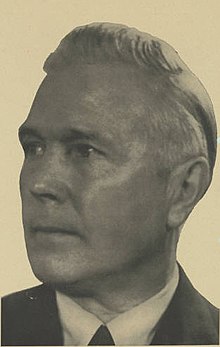Bartram cabinet
| Bartram cabinet | |
|---|---|
| State government of Schleswig-Holstein | |

|
|
| Prime Minister | Walter Bartram |
| choice | 1950 |
| Legislative period | 2. |
| education | 5th September 1950 |
| The End | June 25, 1951 |
| Duration | 0 years and 293 days |
| predecessor | Cabinet Diekmann |
| successor | Cabinet Lübke I |
| composition | |
| Party (s) | BHE, CDU, DP and FDP |
| minister | 7th |
| representation | |
| Schleswig-Holstein State Parliament | 46/69 |
| Opposition leader | Andreas Gayk ( SPD ), until October 9, 1950; Bruno Diekmann (SPD), from October 9, 1950 |
The Bartram cabinet formed the state government of Schleswig-Holstein from September 5, 1950 to June 25, 1951 .
| Office | Surname | Political party | |
|---|---|---|---|
| Prime Minister |
Walter Bartram (1893–1971) |
CDU | |
| Deputy Prime Minister |
Waldemar Kraft (1898–1977) |
BHE | |
| Interior |
Paul Pagel (1894–1955) |
CDU | |
| Finances | Waldemar Kraft | BHE | |
| Food, Agriculture and Forestry |
Otto Wittenburg (1891–1976) |
DP | |
| Economy, construction and transport |
Hermann Andersen (1901–1989) |
FDP | |
| Popular education | Paul Pagel | CDU | |
| Social, labor and refugee issues |
Hans-Adolf Asbach (1904–1976) |
BHE | |
The first freely elected CDU state government in Schleswig-Holstein had only one minister, Paul Pagel , who had not previously been a member of the NSDAP .
Individual evidence
- ↑ Uwe Barschel : The position of the Prime Minister of Schleswig-Holstein with special consideration of the doctrine of the separation of powers, Christian-Albrechts-Universität zu Kiel, 1971, p. 165 [1]
- ^ "Flensburg was a retreat for Nazi leaders" , interview with historian Stephan Linck, Junge Welt , May 17, 2005
